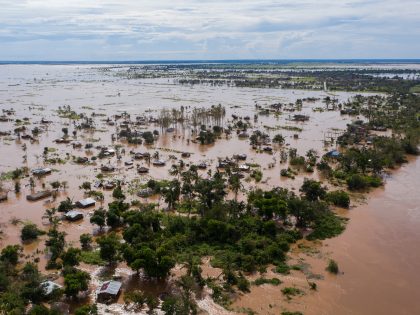
The climate finance crisis
As Mozambique faces escalating climate disasters, it is shut out of the very funds meant to protect it.

As Mozambique faces escalating climate disasters, it is shut out of the very funds meant to protect it.

After 50 Years of independence in Mozambique, what and how to celebrate?

Depois de 50 anos de independência em Moçambique: o quê e como celebrar?

As Mozambique nears 50 years of independence, its ruling party clings to power amid political turmoil, contested elections, and growing public discontent. Is this the beginning of a new struggle for liberation?

À medida que Moçambique se aproxima dos 50 anos de independência, seu partido no poder se agarra ao poder em meio à turbulência política, eleições contestadas e crescente descontentamento público.

Mozambique’s disputed elections triggered a deadly uprising, as citizens resisted Frelimo’s rule and exposed the cracks in neoliberal policies.

On November 21st, 2024, we discussed the politics underlying the popular uprising in Mozambique with António Bai, Anne Pitcher, and José Jaime Macuane.

A decade ago, the kind of protest movement gripping Mozambique over the last few weeks would have been difficult to fathom.

Há dez anos, seria difícil imaginar esse tipo de movimento que vem ocorrendo nas últimas semanas em Moçambique.

After a historic election and on the eve of celebrating fifty years of independence, Mozambicans need to ask whether the values, symbols, and institutions created to give shape to “national unity” are still legitimate today.

Depois de uma eleição histórica e em vésperas de celebrar os 50 anos de independência, os moçambicanos precisam de perguntar se os valores, símbolos e instituições criados para dar forma à “unidade nacional” ainda são legítimos hoje.

Frelimo has been Mozambique’s ruling party since it gained independence from Portugal in 1975, while Renamo has been the official opposition since the end of its civil war. But after recent elections, things are about to change.

Como figura política, Venâncio Mondlane personifica e reflete uma das questões centrais do processo de paz e reconciliação moçambicano: a inclusão política, ou a falta dela.

The EU’s military involvement in West Africa, the Gulf of Guinea, South Sudan, and East Africa is well-known. But one mission on the continent has gone relatively unnoticed.

Todos sabem do envolvimento militar da União Europeia (EU) na África Ocidental, no Golfo da Guiné, no Sudão do Sul e na África Oriental. No entanto, uma missão no continente passou relativamente despercebida.

A solidariedade socialista na Angola e Moçambique pós-coloniais tornou as pessoas queer invisíveis. Revisitar esse apagamento nos ajuda a reinventar a libertação de forma legítima.

Socialist solidarity in postcolonial Angola and Mozambique rendered queer people invisible. Revisiting this erasure helps us imagine liberation anew.

The conflict in Cabo Delgado, Mozambique is entering its sixth year. To combat it, the government should address the underlying local grievances that are driving people toward it.

In Mozambique, a troubling pattern of land grabbing, pollution and death. This time at the hands of a Brazilian-owned coal mine.

Total is creating a social and economic disaster in Mozambique, consulting the same playbook it uses in Myanmar and Yemen where it extracts resources and silences communities.